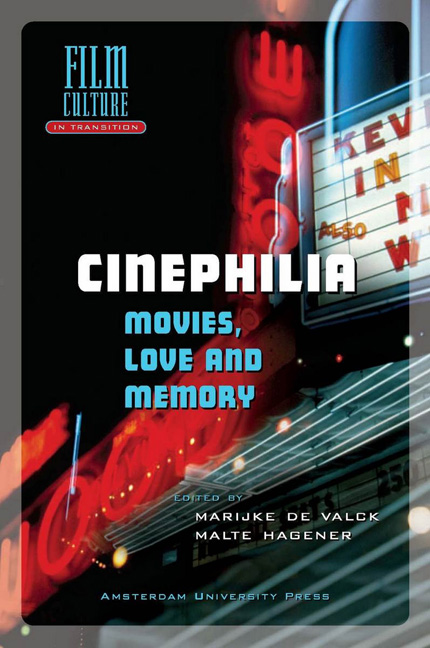Book contents
Mass Memories of Movies: Cinephilia as Norm and Narrative in Blockbuster Culture
Published online by Cambridge University Press: 25 January 2021
Summary
If we equate cinephilia with liking certain movies, the term loses its meaning; but it also does so if we disconnect it entirely from the common habit of liking movies. In its relation to the value-generating cultural economy which circulates everyday affection by and for the cinema on a mass scale, cinephilia involves extraordinary cases of ordinary practices: a love for extraordinary films; an intense love for ordinary ones, capable of charging them with extraordinary qualities; love for a medium as a whole, which, totalized into a lovable whole, turns from a medium into an art or a memory.
Something similar can be said of cinephilia when considered as a theoretical perspective. Here, cinephilia's extraordinariness suggests problems that it poses to disciplinary orders of discourse. This becomes clear if we look at two conceptual approaches to cinephilia that emerged in the 1990s, both use cinephilia as a guideline for thinking about cinema in a broader sense. In Paul Willemen's approach, cinephilia designates a surplus not contained by film analysis; in Thomas Elsaesser's it points to cinema's anomaly with regard to historiography. Both focus on the memorial dimension of loving the cinema, and I will try to abstract and mobilize some of their arguments to discuss how aspects of cinephilia have become normalized in today's media culture and how we re-encounter allegories of cinephilia in the ways people act out their love for movies which are extraordinary in the most ordinary way. I will try to clarify my argument about contemporary blockbuster culture with respect to a movie with lots of love – quantified in box-office terms – attached to it, namely TITANIC (USA: James Cameron, 1997).
In Paul Willemen's reconsideration of cinephilia, the term designates a loving attention to moments of “revelation” experienced in confrontations with highly coded cinematic representations (Hollywood genre movies); an attention and a practice of demarcation that appear close to, but nevertheless remain distinct from theoretical practices of structural analysis, of deconstruction or reading against the grain. What makes cinephilia “resist and escape existing networks of critical discourse and theoretical frameworks” – what keeps love distinct from discipline, one might say – is the surplus of revelation, the involuntary “excess of ‘the seen’ beyond ‘the shown.’”
- Type
- Chapter
- Information
- CinephiliaMovies, Love and Memory, pp. 55 - 64Publisher: Amsterdam University PressPrint publication year: 2005
- 1
- Cited by



